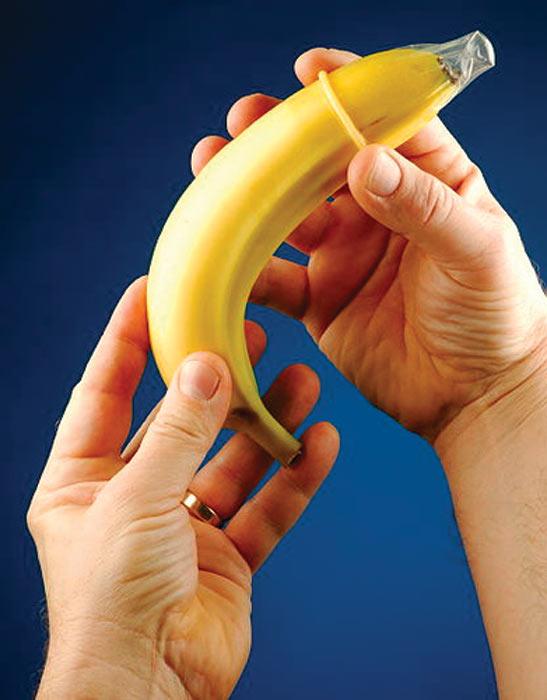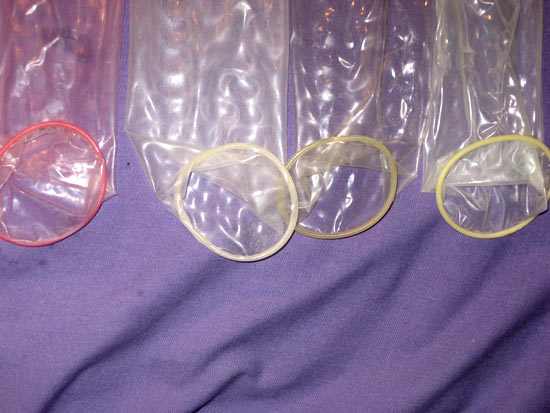Divya Nair/Rediff.com
General practitioner Dr Suruchi Mohite, Aryyan Clinic, Mumbai, talks about the silly myths concerning pregnancy and use of contraception.
Many Indian couples -- married and otherwise -- feel that condoms and pills are obstacles to good sex.
They come to me with strange explanations and justifications for not using contraception.
In fact, it’s the 'emergency pill' that can be more of a problem.
If not consumed in moderation, it can have lasting side-effects -- delayed menstrual periods, menstrual cramps, abdominal pain, weight gain, delayed pregnancies, to begin with.
It may be hard to believe but three out of five pregnancies in India are unplanned.
Couples usually keep their first baby either because it's too late to abort, or due to the insistence of their in-laws.
There is a lot of incorrect information regarding contraception floating around.
Here are some common myths about pregnancy and contraception that need to be debunked.
1. Condoms reduce pleasure
A number of women ask me if there is a way to avoid using condoms during sex because they are not able to enjoy sex.
It's a personal thing, but I suggest that by avoiding the use of condoms, you are putting yourself at higher risk of infections and pregnancy.
Condoms, if used properly, are 80 per cent effective in preventing pregnancy.
Please click NEXT to continue reading...
2. You can use a plastic bag instead of a condom
Image: It would be a bad idea to replace condoms with polythene bags or rubber balloons.Photographs: Bpenn005 on wikibooks/Wikimedia Commons
A condom is not expensive.
A plastic bag may seem like a quick alternative to a self-lubricated condom, but it doesn’t guarantee you safety.
And what about friction?
If the plastic is rough or thick, it can injure or create vaginal infections in your partner.
If it is too thin, there is a good chance of the plastic bag causing a tear inside the vagina thus leading the sperm to enter and cause pregnancy.
Rubber balloons are equally bad. Avoid!
Please click NEXT to continue reading...
3. Pulling out faster avoids pregnancy
Image: When indulging in unprotected sex there is always the risk of the sperm reaching the cervix without your knowledge.The fact is you’ll never know for sure if and when your partner has ejaculated.
Even if he pulls out just in time, there is a risk of a sperm or two reaching the cervix and meeting the egg.
Why not use a condom instead of crossing fingers and hoping that you’ll be safe this time too?
Please click NEXT to continue reading...
4. Pills affect pregnancy
Image: Contraceptive pills are one of the safest methods to avoid pregnancy.Photographs: Rediff Archives
Contraceptive pills are the most effective way to avoid pregnancy.
World over only 2 to 5 per cent of women are unable to take these pills, and even the adverse conditions can be treated medically.
Consumption of pills doesn’t affect your chances of pregnancy. You may use them from the time of puberty till you attain menopause.
If at all you get side effects, consult a gynaecologist immediately to find out if you are allergic to it.
In fact, emergency pills are more likely to affect or delay your chances of pregnancy.
Please click NEXT to continue reading...
5. Taking a bath after sex helps avoid pregnancy
Image: Taking a shower after sex doesn't guarantee you protection from unsafe sex.Photographs: Rediff Archives
A lot of women have confessed to taking a bath or douching -- splashing water or washing their private areas or urinating soon after having sex.
They feel this helps them get rid of any sperm that might have accidentally entered their vagina.
This is far from true. In fact, it may worsen your problems.
By forcibly splashing water on your privates, you increase the chance of pelvic infections and inflammations.
It also increases the chance of developing cervical cancer.
Please click NEXT to continue reading...
6. Sex during periods is safe
Image: The rare ability of sperms to stay active inside the female body puts you at risk even during periods.Photographs: Janine/Creative Commons
It is a commonly believed myth that the seven-day menstrual phase and pregnancy phase are the safest periods to have sex without contraception.
Sorry to break it to you guys, but sperm has the rare ability to stay active for a certain period inside the female body.
In such cases, if the sperm meets the egg at a fertile period, you are at risk of being pregnant.
Please click NEXT to continue reading...
7. Using a condom guarantees safety
Image: Inappropriate use of condoms increases the risk of pregnancy.Photographs: hsedolivia/Wikimedia Commons
There is a 10 to 20 per cent chance that you can get pregnant even after using a condom.
Always pinch the tip of a condom before using it to find out if it’s torn or of poor quality.
A condom is self-lubricated so do not use an external lubricant such as oil or petroleum jelly – it only increases the chance of it being torn during copulation.
Finally, you must realise that there is no pill or condom that guarantees you protection.
Unsolicited information and erroneous judgement can also work to your disadvantage.
For safe and healthy sex, consult a gynaecologist or sexologist and find out what type of contraception works best for you and your partner.








Comment
article